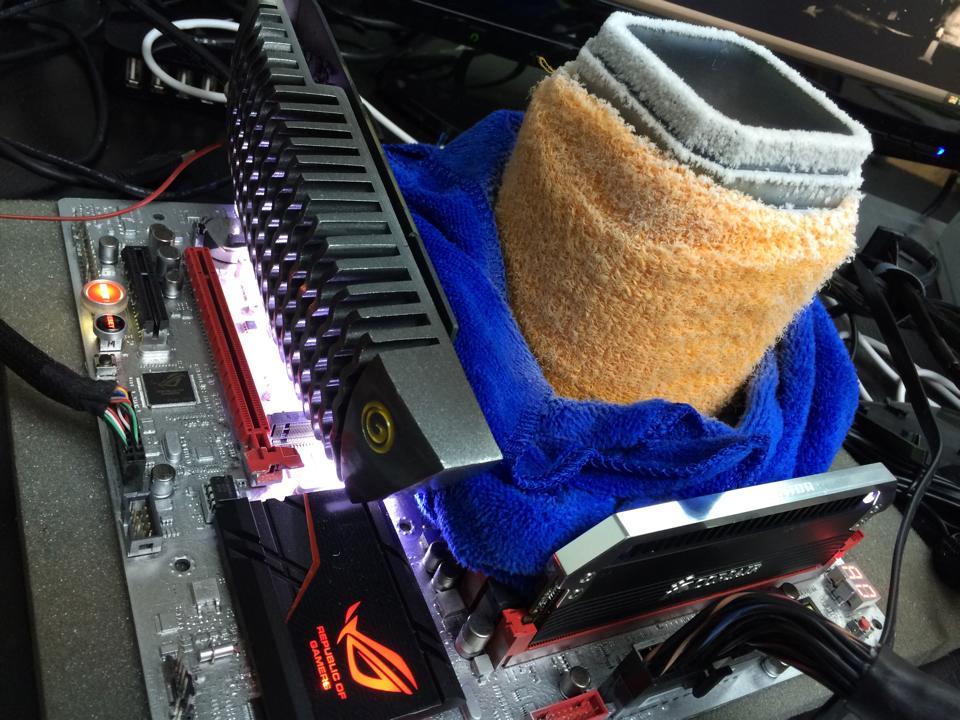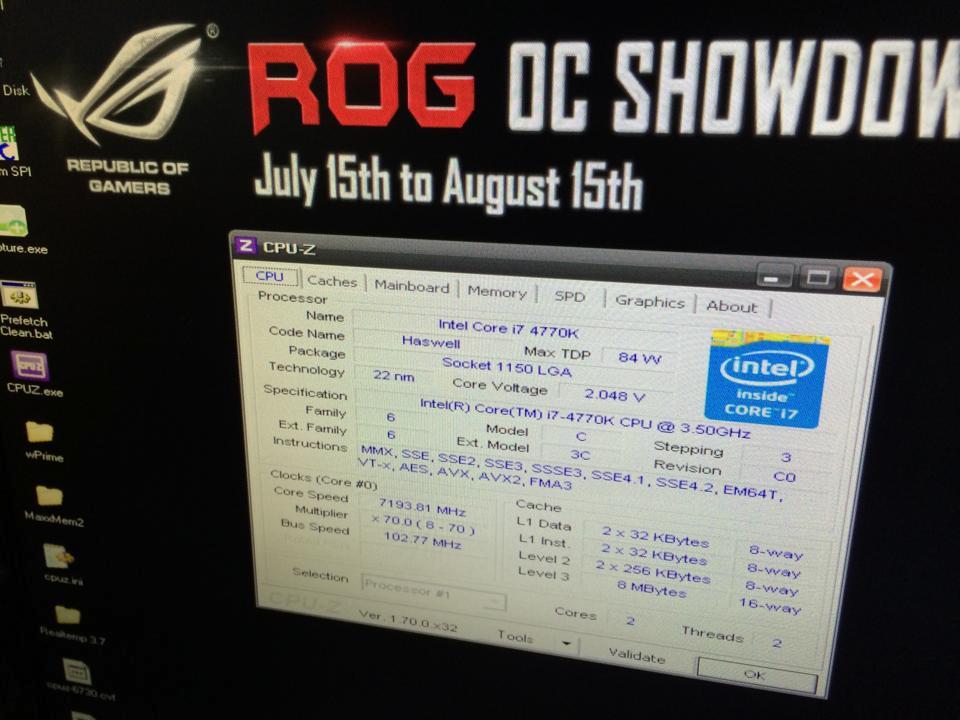World Record: Haswell CPU Overclocked to 7193.8 MHz
Chi-Kui Lam from Hong Kong has set a new overclocking world record.
Do you enjoy overclocking? It's fun if you do it right. One overclocker, Chi-Kui Lam, is probably having quite a lot of fun, as he just set a new world record for the Intel Core i7-4770K. Chi-Kui managed to overclock the chip to a very respectable 7193.8 MHz, which is the highest frequency recorded for any Haswell product to date.
Of course, there are certain costs to reaching such a high frequency. These include using liquid nitrogen for cooling as well as a staggering core voltage of 2.048 V. The CPU's Hyperthreading also had to be disabled, along with two of its cores.
Other hardware used included an Asus Maximus VII Gene motherboard, 256 GB OCZ Vertex SSD, Corsair Dominator memory and a High Current Pro 1300 W power supply from Antec. An Nvidia GT 630 took the graphics load off the iGPU.
Of course, there is no question that this is a completely useless exercise for everyday purposes, but it remains fun to see what certain hardware combinations are capable of.
Follow Niels Broekhuijsen @NBroekhuijsen. Follow us @tomshardware, on Facebook and on Google+.
Get Tom's Hardware's best news and in-depth reviews, straight to your inbox.
Niels Broekhuijsen is a Contributing Writer for Tom's Hardware US. He reviews cases, water cooling and pc builds.
-
derekullo If you disable hyperthreading you have an i5.Reply
If you disable half the cores and hyperthreading you have a highly advanced Pentium D. -
LostAlone So... This isn't actually a world record, it's just a record for a Haswell? Because those are some seriously different things, and I'm certain that a bunch of AMD chips have been taken past 8GHz, and that was a couple of years ago.Reply
It doesn't stop this being cool and all, just that if you're going to call something a world record, it really needs to be the world record for all comparable things. It's like saying that a station wagon set a world speed record, then finding out that it was only for station wagons. -
g00ey If you disable half the cores and hyperthreading you have a highly advanced Pentium D.Reply
Are you sure? As I understand it, the Pentium D was a true dual core Pentium 4 with hyper threading disabled and the P4 was architecturally quite different from the prior Pentium 3. IIRC Intel scrapped the P4 and went back to the design philosophy of the Pentium 3 when they designed the Core Duo CPUs and their successors. -
TechyInAZ ReplyIf you disable hyperthreading you have an i5.
If you disable half the cores and hyperthreading you have a highly advanced Pentium D.
No not a Pentium D, a Pentium G3258 20th Anniversary Edition. -
InvalidError Reply
Yup, that was exactly the first thing I wanted to post when I read the "news."13995097 said:If you disable hyperthreading you have an i5.
If you disable half the cores and hyperthreading you have a highly advanced Pentium D.
No not a Pentium D, a Pentium G3258 20th Anniversary Edition.
No point in getting an i7 to overclock if you are going to downgrade it to Pentium-level feature-wise to get there. -
StarBound I know the point of suicide overclocking is to push a cpu or gpu to the absolute max but when are we going to get to the point where we say the standard is to have the system then run a game or benchmarking tool for an hour and stable before we accept the overclock numbers?Reply -
pills161 Doesn't mean anything really if you have to gimp the chip to get there. I'm with Starbound, being able to boot into windows and open CPU-Z doesn't mean shit to me, let's see you overclock a chip to 7193.8 without partially disabling it and then run some games/benchies and then I'll be impressed.Reply -
jasonelmore ReplyIf you disable hyperthreading you have an i5.
If you disable half the cores and hyperthreading you have a highly advanced Pentium D.
not really true. Cache is still bigger per core, still has more instruction sets (dedicated hardware).
Cache differentiates Core cpu's more than anything besides Hyper Threading. -
mrmotion "Of course, there is no question that this is a completely useless exercise for everyday purposes, but it remains fun to see what certain hardware combinations are capable of."Reply
Looks like you guys quit reading before the end of the article... -
wireframed So really, this is about as fast as a 3GHz i7? Doesn't seem worth it, losing 60% of the performance.Reply
Of course if you only care about singlethreaded apps, but how many of those are really that demanding? Everything I'm waiting on is multithreaded (and almost perfectly parallel).
'Course he didn't do it for the performance, I get that. It just seems odd since he's only focusing on one small part of what performance is. Really nails how pervasive the "frequency = performance" is.


